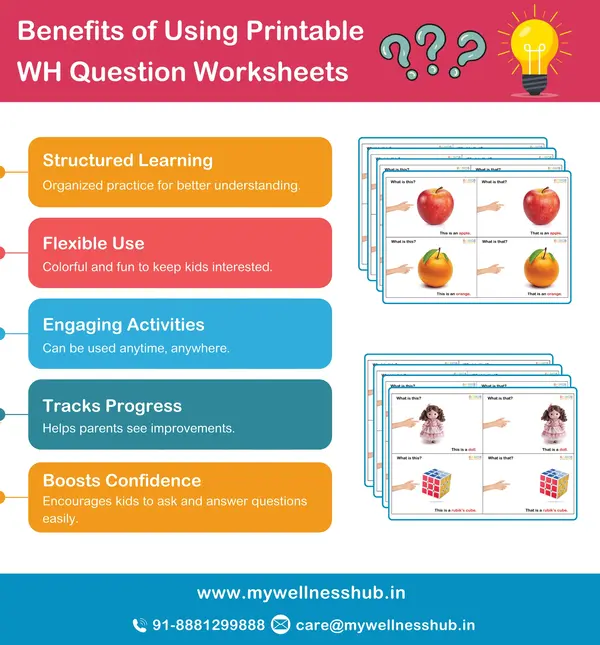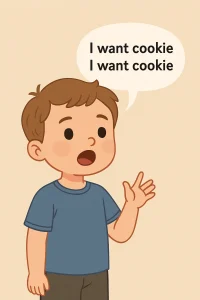WH Questions for Kids: Printable Worksheets and Games
By Rajini D
Last Updated: February 7, 2025
WH Questions for Kids, like “Who,” “What,” “When,” “Where,” “Why,” and “How,” play a crucial role in developing a child’s language and cognitive skills. Not only do these simple yet powerful tools enhance understanding, but they also encourage curiosity and promote deeper engagement with the world.
At Wellness Hub, we provide engaging and printable worksheets designed to make learning these essential questions both fun and effective. Moreover, these worksheets offer a structured way for children to grasp WH questions through interactive exercises.
In this article, we will explore how WH questions benefit your child, why printable worksheets are an excellent resource, and how you can incorporate them into daily learning routines. So, let’s get started!
What are WH Questions?
WH questions are essential tools for communication that help children understand and interact with the world around them. Each type begins with a unique word that prompts specific information:
- Who: Identifies people. Example: “Who is your friend?”
- What: Inquires about objects or actions. Example: “What are you drawing?”
- When: Seeks information about time. Example: “When is your birthday?”
- Where: Aims to locate places. Example: “Where did we park the car?”
- Why: Explores reasons behind actions or events. Example: “Why do we brush our teeth?”
- How: Describes methods or conditions. Example: “How do you make a sandwich?”
Also Read: WH Questions Examples for Kids: How to Teach with Fun Activities
Advantages of Using Printable WH Question Worksheets
Printable WH question worksheets are a fantastic resource for parents looking to enhance their child’s communication skills. Here’s why incorporating these worksheets into your teaching routine can be so beneficial:
1. Structured Learning:
These worksheets provide a structured approach to learning WH questions, which is essential for young learners. By systematically introducing each type of WH question, children can build their understanding step-by-step, ensuring they grasp the basics before moving on to more complex queries.
2. Reinforcement of Concepts:
Repetition is key in early education, and printable worksheets allow children to practice WH questions multiple times. This repetition helps reinforce what they’ve learned, making it easier for them to apply these questions in everyday conversations.
3. Engaging Content:
Many worksheets come with colorful illustrations and engaging tasks that make learning fun. Children are more likely to stay interested and motivated when their learning materials are visually appealing and interactive.
4. Measurable Progress:
With printable worksheets, it’s easy to track your child’s progress. You can see which concepts they’ve mastered and where they might need more help, allowing for targeted learning that addresses specific areas of need.
5. Flexibility:
Printable worksheets offer the flexibility to learn anytime and anywhere. Whether at home, on vacation, or during a quiet moment, these resources are readily available to help your child practice essential language skills.
6. Parental Involvement:
Using these worksheets gives you, as a parent, an active role in your child’s language development. It’s an opportunity to engage directly with your child’s education, providing support and encouragement as they learn.

Lear More: Why WH Questions Matter for Kids and How to Teach Them
Top Printable WH Question Worksheets
At Wellness Hub, we pride ourselves on offering a variety of printable WH question worksheets that cater to the diverse needs of young learners. These worksheets are designed not just to educate but to captivate and motivate children across different age groups. Here’s a look at some of our top picks and why they stand out:
1. “WH Questions Starter Pack” for Beginners
- Age Group: Preschoolers (3-4 years)
- Features: This set includes basic “Who,” “What,” and “Where” questions using simple words and bright, engaging pictures that help capture the attention of young learners.
- Benefits: Helps children start forming simple questions by associating words with pictures, fostering early language skills.
2. “Everyday WH Questions”
- Age Group: Kindergarteners (5-6 years)
- Features: Focuses on all WH questions, incorporating everyday scenarios like family, school, and park visits to make the questions relatable and understandable.
- Benefits: Enhances vocabulary and encourages children to apply WH questions to real-life situations, improving their conversational skills.
3. “WH Question Challenge” for Advanced Learners
- Age Group: Early Elementary (7-8 years)
- Features: Includes complex “Why” and “How” questions that require more critical thinking and detailed responses.
- Benefits: Develops advanced reasoning and language skills, preparing children for more complex conversation and academic success.
4. “Interactive WH Question Game Sheets”
- Age Group: Mixed ages
- Features: Combines learning with play through interactive elements like spinners and dice rolls to select questions.
- Benefits: Makes learning dynamic and fun, suitable for siblings of different ages or peer learning groups.
5. “Customizable WH Question Worksheets”
- Age Group: Tailored to individual needs
- Features: Allows parents and educators to customize questions based on the child’s interests and current learning topics.
- Benefits: Increases engagement by integrating personalization, which helps children connect more deeply with the material.
Also read: WH Questions for Kids: A Simple Guide to Teaching and Learning
How to Effectively Use Printable WH Question Worksheets at Home
Integrating printable WH question worksheets into your child’s daily learning routine can be a fun and effective way to boost their language skills. Here’s a detailed guide to help you make the most out of these educational tools, ensuring your sessions are both engaging and productive.
Step-by-Step Instructions for Using Worksheets
1. Introducing the Worksheet
- Set the Right Environment: Choose a quiet and comfortable space free from distractions. Ensure the area is well-lit and inviting, making it conducive to learning.
- Explain the Purpose: Start by explaining what WH questions are and why they are important. You can use examples from daily life to make it relatable, such as, “When we ask ‘What is your name?’ we are using a WH question to learn about someone.”
2. Explaining WH Questions Using the Worksheets
- Walk Through the Worksheet: Before your child begins, go through the worksheet together. Discuss the images or contexts presented and read the questions aloud.
- Demonstrate Examples: Show how to answer a question from the worksheet yourself. This modeling helps children understand how to think about and formulate their answers.
3. Engaging Your Child
- Interactive Reading: Read the questions aloud and let your child answer verbally before writing. This dual approach reinforces learning through speech and writing.
- Turn It into a Game: Create a small reward system for each correct answer or for effort, such as stickers or a chart with stars. This can make learning more playful and motivating.
4. Providing Feedback and Reinforcement
- Positive Reinforcement: Always provide positive feedback, focusing on what your child did well before addressing mistakes. Encourage them by pointing out specific things they did right, like using a question word correctly.
- Constructive Feedback: When correcting errors, be gentle and encouraging. Explain the correct answers and let them try again. This approach helps build confidence and understanding.
5. Regular Practice
- Make It a Routine: Incorporate these worksheets into your daily or weekly learning schedule. Consistency is key in reinforcing new skills.
- Review and Repeat: Regularly revisit completed worksheets to review the questions and answers. Repetition will help cement the concepts in your child’s mind.
Find More: How to Teach WH Questions to Kids at Home – Fun & Easy Tips!
Games and Activities to Enhance Worksheet Learning
Combining play with structured learning activities like worksheets can greatly enhance a child’s understanding and retention of new concepts. Here are some engaging games and activities that complement WH question worksheets and help solidify the lessons in a fun, interactive manner.
1. WH Question Bingo
- How It Works: Create bingo cards with answers to WH questions from the worksheets. As you call out the questions, children place markers on the correct answers. The first to complete a line wins.
- Educational Benefit: This game helps children quickly recall information and understand the context of WH questions, improving their response times and accuracy.
2. WH Question Role-Play
- How It Works: Set up scenarios where children have to use WH questions and answers from their worksheets. For instance, one child plays a shopkeeper, while another is a customer who asks questions like, “What do you sell?” or “When do you close?”
- Educational Benefit: Role-playing helps children practice the practical application of language skills in everyday situations, boosting their confidence and social interactions.
3. Memory Matching Game
- How It Works: Use cards that have WH questions on one set and their corresponding answers on another. Mix them up and lay them face down. Players take turns flipping two cards at a time to find matching pairs.
- Educational Benefit: This game enhances memory and encourages deeper understanding as children have to remember the location of specific questions and their answers.
4. WH Question Treasure Hunt
- How It Works: Hide clues around the house or classroom that lead to a ‘treasure.’ Each clue must contain a WH question that leads to the next clue. The treasure can be a small reward or a certificate of achievement.
- Educational Benefit: A treasure hunt with WH questions motivates children to solve problems and follow directions, engaging multiple senses in the learning process.
5. Story Cube WH Questions
- How It Works: Use story cubes with pictures or words related to the WH questions from the worksheets. Children roll the cubes and then make up stories or sentences based on the images or words that face up, incorporating WH questions.
- Educational Benefit: This activity encourages creativity and helps children learn how to construct questions and answers in a narrative format, enhancing their storytelling skills.
Conclusion
WH questions—Who, What, When, Where, Why, and How—are key to building strong language and thinking skills in kids. Using printable WH question worksheets makes learning fun, easy, and engaging. They help kids practice, understand, and use these questions in everyday conversations. You can also combine worksheets with simple games to keep learning exciting. For more fun, ready-to-use worksheets, check out Wellness Hub printable resources. They’re perfect for parents who want to support their child’s learning at home. Start today and watch your child’s communication skills grow, one question at a time!
Frequently Asked Questions:
1. What are WH questions for kids?
WH questions are questions that start with words like Who, What, When, Where, Why, and How. They help kids learn how to ask questions, think critically, and improve their language skills.
2. Why are WH questions important for child development?
WH questions boost a child’s communication and thinking skills. They encourage kids to express themselves, understand information better, and engage in meaningful conversations.
3. How can I teach WH questions to my child at home?
You can teach WH questions through printable worksheets, simple games, storytelling, and daily conversations. Asking questions like “What are you doing?” or “Where is your toy?” helps kids practice naturally.
4. What are the best printable WH question worksheets for kids?
The best worksheets are colorful, engaging, and age-appropriate. Wellness Hub’s printable WH question worksheets are designed to make learning fun and effective for kids.
5. How do printable worksheets help kids learn WH questions?
Printable WH question worksheets offer structured practice. They help kids understand different question types, improve vocabulary, and reinforce learning through repetition.
6. At what age should I start teaching WH questions to my child?
You can start teaching basic WH questions to toddlers around 2-3 years old. Begin with simple questions like “What’s this?” or “Where’s your ball?” and gradually introduce more complex ones as they grow.
7. Can WH question games improve my child’s language skills?
Yes! WH question games make learning interactive and fun. Games like scavenger hunts, role-playing, and bingo help kids practice asking and answering questions in an enjoyable way.
8. How do I make WH question worksheets more fun for my child?
Turn worksheets into games! Use stickers, rewards, and colorful markers to make activities engaging. You can also combine worksheets with fun activities like storytelling or drawing.
9. How often should my child practice WH questions?
Practicing WH questions a few times a week is helpful. Short, fun sessions (10-15 minutes) work best. Consistency is key to reinforcing language skills without overwhelming your child.
10. Where can I find free printable WH question worksheets?
You can find a variety of printable WH question worksheets at Wellness Hub. These resources are designed to support parents in teaching language skills effectively at home.
About the Author:
Rajini Darugupally
M.Sc., Speech-Language Pathologist (9+ years of experience)
Rajini is a passionate and dedicated Speech-Language Pathologist with over 9+ years of experience, specializing in both developmental speech and language disorders in children and rehabilitation in adults. Driven by a desire to empower each individual to find their voice, Rajini brings a wealth of experience and a warm, genuine approach to therapy. Currently, at Wellness Hub, she thrives in a team environment that values innovation, compassion, and achieving results for their clients.
Book your Free Consultation Today
Parent/Caregiver Info:
Client’s Details:
* Error Message








